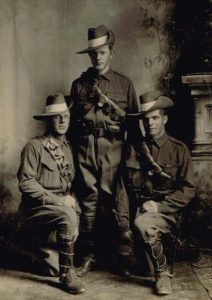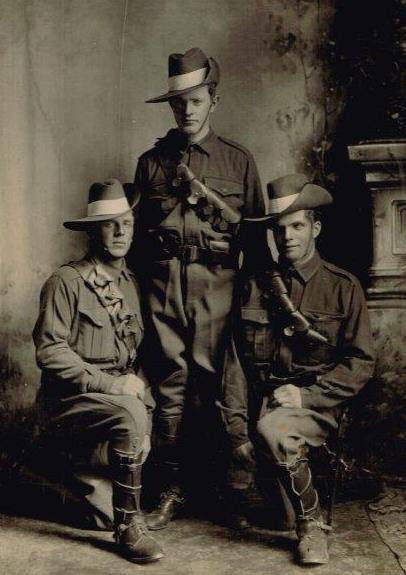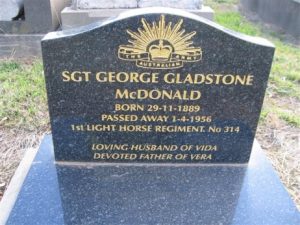
George Gladstone McDonald (centre) with mates Jim (‘Wilf’) Kenny (left) and George Hills (right). Image courtesy Vera Pickford.
George Gladstone McDonald was born in Crookwell on 29 November 1889 and was one of three of the eight children of George and Clara McDonald who enlisted to serve in World War I – his enlistment date was 25 August 1914. The Light Horse squadrons trained at Rosebery Racecourse in Sydney prior to departure on HMAT A16 Star of Victoria on 20 October 1914.
George was my father and, although he was 45 when I was born, he was still a very active man and a strict Dad whose two favourite hobbies were reading and going on long walks – he would read for hours, fiction, history, anything that he could find.
George served in several war zones; he was at Mudros in 1915, then Abbassia, Boulac, Moascar and Cairo. He was fascinated by the Egyptian pyramids and culture and often talked about them following his return from the war.
On 22 February 1917 George was appointed to the Permanent Cadre of the Light Horse and sent to the School of Instruction until 14 May 1917, then back to his regiment on 5 June 1917.
George also spent periods in various hospitals with renal colic and malaria, and these health problems stayed with him all his life.
After 4 years and 195 days of overseas service George arrived back in Australia on 24 February 1919 in poor health, and received a great coat, civilian suit and cap for that service to his country.
Because of his health problems George found it difficult to find work and ended up on a road gang in the Crookwell area where he met his wife, Vida Amelia Tranter of Bigga NSW. They married in 1934, and in 1940 the extended Tranter family and George and Vida and I moved to Orange to live.
George had been very well educated at Fort Street High School but found it difficult to find work after his war service. His first job in Orange was as an attendant at Bloomfield Mental Hospital which caused him considerable stress as he encountered patients who were there as a result of their war experiences – other young soldiers who just never recovered from the trauma of war.
His next job was in Sydney, where he worked for a short period as a storeman at The Wool Stores. During this time we lived in rented rooms in York Street North. This was during the Second World War and we were there the night the Japanese submarine entered Sydney Harbour – there were searchlights everywhere, sirens wailing and people running down our street to the water’s edge. The following morning my mother took me down to the water-front to see the submarine while Dad was at work.
After a short period in Sydney we returned to Orange where Dad obtained a job working on the construction of Warragamba Dam. Workers were picked up very early Monday morning and lived in barracks on the site till they were brought back home at the end of each week.
His next job was as a storeman at the Small Arms Factory in Orange, where he stayed for some time. After he left there he and Vida took jobs “living in” as household staff at doctors’ surgeries, a local “gentleman’s club”, where he was the handyman, or in the case of the Canobolas Club, where George was the head steward and Vida was cook and housekeeper.
In between these jobs, we would move back to our Tranter family home in Orange where my Tranter grandfather was head of the house. That was a difficult time for George as he had no authority – he was not the head of the house, so would spend a lot of his spare time in his room reading.
One of the saddest things George experienced during the war, apart from the loss of good mates, was at the end of the war when the time came to return home and the Light Horsemen had to leave their beloved horses behind – he said shooting their horses was like shooting your best mate. Dad had always loved horses and sometimes on Saturdays he would borrow a mate’s horse and sulky and take Mum and I for a trip around the country roads on the outskirts of Orange.
George also enjoyed ballroom dancing and was a lovely dancer. On warm summer nights the old gramophone would come out onto the wide front verandah, he would put on a waltz record and teach me to dance.
George never really retired from work because he loved having something to do to fill his days – he never played bowls, or joined any organisations – so reading, walking and caring for his family were his favourite things to do. Dad was a great walker, and since Mum would not join him, I spent my youth walking all over Orange, trying to keep up with him.
George’s sister Florence Emily Isabel McDonald, also served in WW1 as a nurse. She later married a man who coincidentally shared her brother’s name. My Uncle George had a property on the outskirts of Orange and every Thursday he and Aunt Florence would come to have lunch at our place. They would bring us home-made butter, fresh milk and sometimes a joint of freshly-slaughtered sheep. My father always welcomed Florence but they never talked about the war.
In 1956 we were living in the service flat behind a well-known doctor’s surgery, where George was the gardener and general handyman, when I became engaged, and started planning an October wedding. Dad was very excited about it and started practicing waltzing with me, insisting that he was going to waltz me into my wedding reception.
Sadly, on 1 April 1956 George had a major heart attack and, despite the efforts of the doctor, passed away in my arms – so he never got to my wedding.
George’s grandchildren and great-grandchildren, although they never knew him, have always taken a great interest in him and his war service. Hanging in our loungeroom is a large framed tribute which includes details of his war service, photographs, excerpts from letters he wrote home and many other comments. This memento was made by his youngest great-granddaughter as her Higher School Certificate art project and is most valued by the family.
* Vera Pickford 2016. Vera is the daughter of Sgt. George Gladstone McDonald, 1st Light Horseman, WWI.
George and mates Jim (‘Wilf’) Kenny and George Hills fought in The Battle of Dead Man’s Ridge at Gallipoli on 7 August 1915. George McDonald survived the battle; Wilf lost an eye and George Hills died the following day of wounds received during battle.


